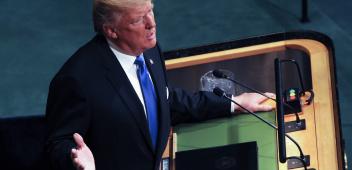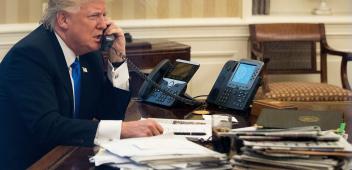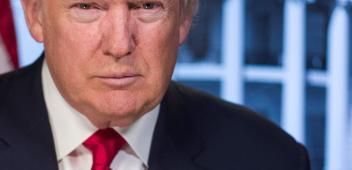Diplomacy Isn't Just for the Diplomats
Diplomacy Isn't Just for the Diplomats
Dr Michael Fullilove
US News
4 March 2014
http://www.usnews.com/opinion/articles/2014/03/03/dont-worry-about-obamas-political-ambassador-nominations

Executive Summary
A string of gaffes from some of President Obama’s ambassadorial nominees has drawn attention to one of the odder aspects of U.S. statecraft: the practice of appointing non-diplomats to important diplomatic posts.
It all started with an embarrassing confirmation hearing. In his appearance before the Senate Foreign Relations Committee in January, George Tsunis, Obama’s nominee as U.S. ambassador to Norway, demonstrated a few gaps in his knowledge of the country to which he hopes to be accredited. He seemed to be unaware that the anti-immigrant Progress Party is the third-largest political party in the Norwegian parliament and a junior member in its coalition government. He also appeared to lack a basic understanding of Norway’s constitution. Tsunis referred to Norway’s “president,” which will make it a bit awkward if he eventually gets to present his credentials to His Majesty King Harald V.
It turns out that Tsunis was not selected by the president because he is a world expert on Scandinavia. Rather, he is the CEO of a hotel chain who happens to be one of the Democratic Party’s most generous donors, directing more than half a million dollars to the party in the last few years.
Then, a few weeks later, Obama’s nominee to be U.S. ambassador in Buenos Aires, Noah Bryson Mamet, admitted under questioning that he had never actually been to Argentina.
Naturally, these kinds of performances lead to tut-tutting from the good-government mavens and the diplomatic shop-stewards.
As a former officeholder in the American Foreign Service Association asked a few years ago, “Why is ours the only profession where it is considered acceptable to appoint someone without any experience?” The bean-counters at the association have calculated that 36.6 percent of Obama’s ambassadorial appointments have been political picks, which is slightly higher than the historical norm.
To be sure, political appointees are sometimes hopeless. Occasionally they are indefensible.
For example, in 1989 a former one-term senator from Nevada, Chic Hecht, was appointed to be the U.S. ambassador to the Bahamas. Hecht enumerated his qualifications for the job in this way: “I’m sure I will feel at home in the Bahamas, I’ve been involved in gambling in Nevada ... Also, I understand it is a nice lifestyle. I love golf and they have a lot of nice golf courses and good fishing.”
More serious is the case of Vincent de Roulet. As documented by the Center for Public Integrity, de Roulet was appointed as U.S. ambassador to Jamaica in 1969 following a donation of $75,000 to Richard Nixon’s election campaign. After bragging at a Senate foreign relations subcommittee hearing about how he had wielded his influence in Jamaica’s politics on behalf of U.S. companies, de Roulet was declared persona non grata in Jamaica.
It is certainly true that the predilection of presidents for reserving a third of ambassadorial posts — especially the fancy ones with nice residences — for non-diplomats drains the U.S. foreign service of some of its prestige. But political appointees also have certain advantages over their career counterparts. They are more likely to have a personal relationship with the president, which is gold in the world of international relations. As outsiders, they can have different perspectives and skills from those which are prized at Foggy Bottom. While we should not assume that that all political donors are smart, equally we should not assume that former business, political and community leaders have no experience relevant to running a diplomatic mission and representing their country abroad.
President Obama has appointed several outstanding non-career diplomats. Mike McFaul, Obama’s man in Moscow, who resigned last month, is an example. McFaul, a scholar and former presidential adviser who was the principal author of Obama’s attempt to "reset" the U.S. relationship with Russia, was the first non-career diplomat to occupy Spaso House in three decades. His use of social media earned him the moniker "the tweeting ambassador," as well as the ire of the Putin regime. Sometimes the ride has been bumpy, attested to by the harassment McFaul has received from the state-owned Russian media.
The diplomatic Illuminati would argue that it was McFaul’s undiplomatic approach that led to this predicament. In fact, the opposite is true. It was McFaul’s openness, optimism and energy, as well as his friendship with his boss, that made him an authentic and effective American representative during a difficult time in U.S.-Russia relations.
Another example is the former Republican governor of Utah, Jon Huntsman, who was a first-rate ambassador to China, and not only because he was fluent in Mandarin. Huntsman’s background in business appealed to the Chinese; his status as a likely presidential candidate lent him a clout that no career diplomat could possibly have matched.
Obama’s former ambassador to France, former entertainment executive Charles Rivkin, is widely regarded as having done a good job in Paris. The president’s last ambassador to Australia, former San Francisco corporate lawyer and White House special counsel Jeff Bleich, conducted himself in Canberra with intelligence and agility.
Criticisms of the politicization of diplomatic appointments assume that the U.S. foreign service officers who are being deprived of these postings are uniformly brilliant. It is true that the best American career diplomats are as good as any in the world, but like all bureaucracies, the State Department also contains time-servers and underachievers. So mixing up the appointments now and again is a good thing.
In any case, the phenomenon of political ambassadors is really just one piece of a larger puzzle. In the U.S. system generally, political appointees play a much larger role than in most countries. Cabinet positions are appointed, not elected as they are in Westminster democracies, and the White House is often staffed by people with little background in executive government. Basically, the U.S. system privileges talent over experience, and it usually works out OK in the end.
Ultimately, the merits of political appointments to diplomatic positions depends on the qualities of the individual in question and the fit between the person and the post. There are bad political appointments and there are good political appointments – as illustrated by two of Franklin D. Roosevelt’s ambassadors to London.
Joseph P. Kennedy was the Irish-American millionaire and patriarch – and outspoken isolationist – whom Roosevelt unaccountably made ambassador to the Court of St James’s in 1938. Privately, FDR regarded Kennedy as an “appeaser,” and even suspected him of making a large profit while serving in London by selling Czech securities short just before the invasion of Czechoslovakia. There were political reasons for the appointment, but in retrospect it seems like the kind of impulsive move of which Roosevelt was sometimes guilty.
By contrast, his next appointment to London was a masterstroke. After Kennedy’s resignation in 1940, Roosevelt tapped liberal Republican and former governor of New Hampshire, John G. Winant, for the post.
From his days as director of the International Labour Office, Winant had strong links with the British left and the Labour Party, which FDR rightly believed would be the dominant political force after the war. He was also unusually well-equipped to establish a warm relationship with the British public.
Although Winant was intense, awkward and painfully shy, he also had great gifts of sympathy and compassion. He went to extreme lengths to identify himself with the British. He lived simply, eschewing the grand ambassadorial residence overlooking Hyde Park in favor of a small flat in Grosvenor Square, next to the embassy. He made a point of living on British wartime rations. He was often seen walking the streets of London after an air raid, offering assistance to those left homeless. The contrast with Joe Kennedy could hardly have been more dramatic. Winant represented, recalled an aide to the press baron and minister Lord Beaverbrook, “a pinnacle after an abyss.”
Ambassadors’ success depends as much on their personal qualities and their relationships back in Washington as on their professional backgrounds. This doesn’t change the fact, of course, that poor Norway seams to be heading for the abyss.



